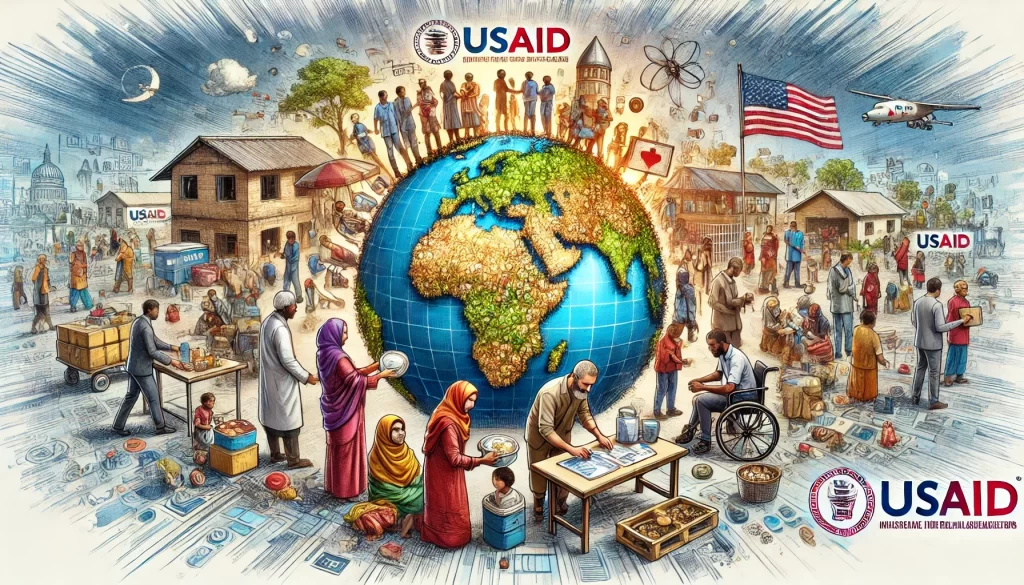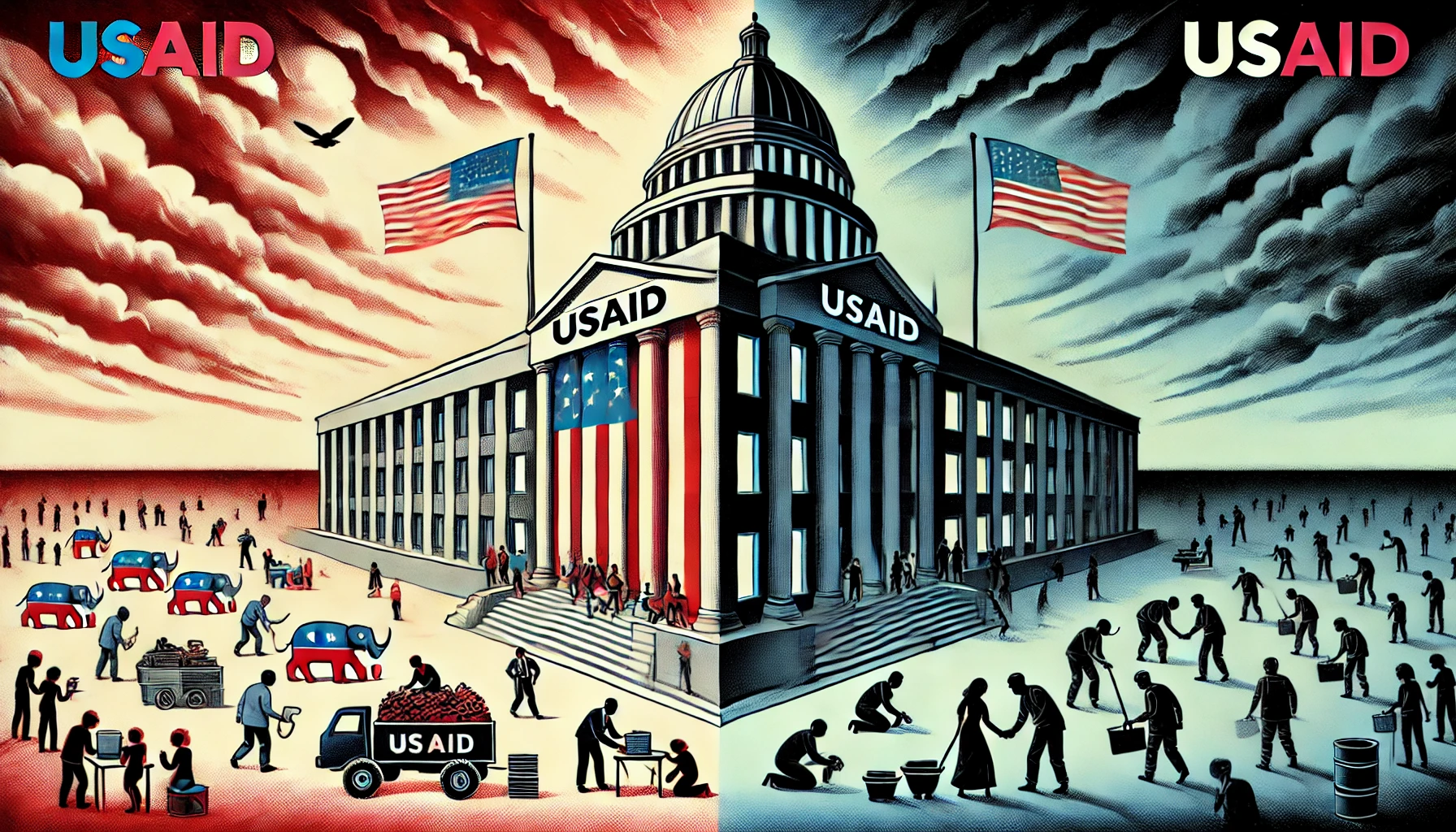The U.S. Agency for International Development (USAID), a key organization that distributes billions of dollars in humanitarian aid worldwide, is facing potential shutdown after President Donald Trump and billionaire Elon Musk agreed that the agency should be dismantled. This decision has led to widespread concern among lawmakers, foreign aid workers, and international allies.
Musk and Trump Call for USAID’s Closure
Elon Musk, who has been working with the Trump administration through his newly formed Department of Government Efficiency (DOGE), announced in a conversation on X Spaces that he had spoken with Trump, and they both agreed that USAID should be “shut down.” He criticized the agency as being “politically partisan” and “beyond repair,” stating, “We don’t have an apple with a worm in it—we have a ball of worms.”
Trump also criticized USAID, calling it an agency “run by a bunch of radical lunatics” and alleging that it had engaged in “tremendous fraud”. However, neither Trump nor Musk provided specific evidence to support these claims.
Immediate Impacts: Staff Suspensions and Office Closures
Following the announcement, the Trump administration froze USAID’s funding, which led to the suspension of several foreign aid programs. Around 60 senior USAID officials were placed on administrative leave for allegedly trying to bypass Trump’s executive order to halt foreign aid for 90 days. The agency’s website went offline, and many employees lost access to their work emails.
Two top USAID security officials were also suspended after refusing to grant DOGE members access to the agency’s systems. According to reports, DOGE personnel attempted to physically enter USAID’s headquarters in Washington, D.C., and eventually gained access despite resistance from agency officials.
Secretary of State Marco Rubio, who was recently appointed as the acting head of USAID, confirmed that the agency was undergoing a “review” and might be merged with the State Department.

Concerns Over Foreign Aid Disruptions
USAID has played a significant role in providing humanitarian assistance across the world since its creation in 1961 under President John F. Kennedy. It funds projects aimed at alleviating poverty, responding to natural disasters, and supporting democracy. Critics argue that shutting down the agency could have dire consequences.
Democratic lawmakers have called the move “illegal and unconstitutional” and warn that it could harm U.S. national security and weaken American influence abroad. Senator Chris Van Hollen stated, “It’s not only a gift to our adversaries… it is plain illegal.” Representative Jamie Raskin accused the administration of violating workers’ rights and “trampling the Constitution.”
Humanitarian workers have also expressed alarm, noting that the freeze on USAID funding has already led to the closure of life-saving medical centers in Afghanistan and disrupted aid programs in Syria. A former USAID official warned, “We’re basically going to be punching with one arm behind our back” if USAID is shut down.
Legal and Political Challenges Ahead
Musk’s DOGE group, which is not an official government entity but has been given significant power by Trump to cut costs, has faced legal challenges over its actions. There are questions about whether the executive branch can shut down a congressional agency like USAID without approval from Congress.
Trump has dismissed these concerns, stating that closing USAID does not require congressional approval “if it’s an act of fraud.” However, legal experts and lawmakers argue that USAID was established by law and cannot be dissolved without congressional action.
What Happens Next?
While Rubio has suggested that some of USAID’s work will continue under the State Department, many fear that the agency’s mission will be significantly weakened. Aid groups and foreign governments are watching closely to see how the situation develops, as disruptions to USAID funding could impact millions of people worldwide.
This article is based on the following articles:
https://www.npr.org/2025/02/03/nx-s1-5285409/usaid-trump-state-department-rubio
https://www.bbc.com/news/articles/cdjdmx12j9no
https://www.cnn.com/2025/02/02/politics/usaid-officials-leave-musk-doge/index.html

Background Information
What Is USAID?
USAID, or the United States Agency for International Development, is an organization that was created in 1961 by President John F. Kennedy. It was established as an independent government agency responsible for distributing humanitarian and economic aid to countries in need.
USAID’s mission is to support people around the world by providing:
- Food aid during famines and natural disasters
- Medical assistance to prevent diseases and improve healthcare
- Education programs to help children and adults gain skills
- Infrastructure development, such as roads and clean water systems
- Democracy and human rights support, including election monitoring and support for free speech
Even though USAID is independent, it works closely with the U.S. Department of State, which manages America’s foreign relations.
Why Does the U.S. Provide Foreign Aid?
Foreign aid serves multiple purposes for the United States. Some of the main reasons why the U.S. provides aid to other countries include:
- Humanitarian Assistance – When natural disasters (such as earthquakes, hurricanes, or droughts) strike, USAID helps by providing emergency food, clean water, and shelter.
- Disease Prevention – USAID helps fund efforts to fight diseases like malaria, tuberculosis, and HIV/AIDS.
- Economic Development – Providing financial and technical support helps poor countries build stronger economies, reducing global poverty.
- National Security – Aiding other countries can help stabilize regions that might otherwise become dangerous due to conflict or terrorism.
- Diplomatic Influence – By providing aid, the U.S. can build stronger relationships with other nations, which can help in international negotiations and cooperation.
What Does It Mean to “Shut Down” an Agency Like USAID?
Shutting down USAID would mean that the billions of dollars the U.S. spends each year on helping other countries would either stop completely or be moved to another part of the government, like the State Department. It would also mean that thousands of workers at USAID would lose their jobs or be reassigned. Programs that provide food, medical care, education, and disaster relief would be paused or eliminated.
Who Is Elon Musk and What Is DOGE?
Elon Musk is a billionaire businessman who owns companies like Tesla (electric cars) and SpaceX (space exploration). Recently, he has taken an active role in government affairs by leading an unofficial group called the Department of Government Efficiency (DOGE).
DOGE was not created by Congress and is not an official government agency, but Trump has given it broad power to cut government spending. Some experts question whether DOGE has the legal authority to shut down agencies like USAID.
How Does the U.S. Government Work?
The U.S. government is divided into three branches that each have different powers. These are:
- The Executive Branch (led by the President) – Enforces the laws.
- The Legislative Branch (Congress: the Senate and House of Representatives) – Makes the laws.
- The Judicial Branch (Supreme Court and other federal courts) – Interprets the laws.
Since USAID was created by Congress, many lawmakers argue that only Congress has the power to shut it down or merge it into another agency.
What Is the State Department?
The U.S. Department of State is responsible for foreign policy and international relations. It negotiates with other countries, maintains embassies, and works with allies to achieve U.S. goals abroad. If USAID is merged into the State Department, its responsibilities might shift, and some of its projects could be canceled or changed.
What Are the Main Arguments For and Against Shutting Down USAID?
There is a major debate over whether shutting down USAID is the right decision.
Arguments in Favor of Shutting Down USAID:
- Government Waste – Some argue that USAID is inefficient and that tax dollars could be better spent.
- Political Bias – Critics, including Trump and Musk, claim USAID is politically biased and supports causes that do not align with American interests.
- Cutting Costs – The Trump administration believes eliminating USAID would reduce federal spending and help balance the budget.
Arguments Against Shutting Down USAID:
- Humanitarian Impact – Many experts warn that shutting down USAID would hurt millions of people who depend on U.S. aid for survival.
- National Security Concerns – Some say that reducing foreign aid could make the world less stable and give more power to U.S. rivals like China and Russia.
- Legal Issues – Since USAID was created by Congress, some lawmakers argue that it cannot be shut down without congressional approval.
How Has Foreign Aid Helped in the Past?
To understand the importance of USAID, here are some real-world examples of how U.S. foreign aid has helped people across the globe:
- Haiti Earthquake (2010) – After a massive earthquake, USAID provided food, medical supplies, and rebuilding efforts to help Haitians recover.
- Ebola Crisis (2014-2016) – USAID helped fight the deadly Ebola virus in West Africa, preventing a global outbreak.
- Ukraine Conflict (2022-Present) – USAID provided billions of dollars in humanitarian and military aid to Ukraine to support its fight against Russia.
- COVID-19 Pandemic (2020-Present) – The U.S. helped distribute vaccines and medical aid to many countries through USAID efforts.

Debate/Essay Questions
- Should the U.S. shut down USAID?
- How would shutting down USAID affect the U.S.’s global reputation?
Please subscribe to Insight Fortnight, our biweekly newsletter!
